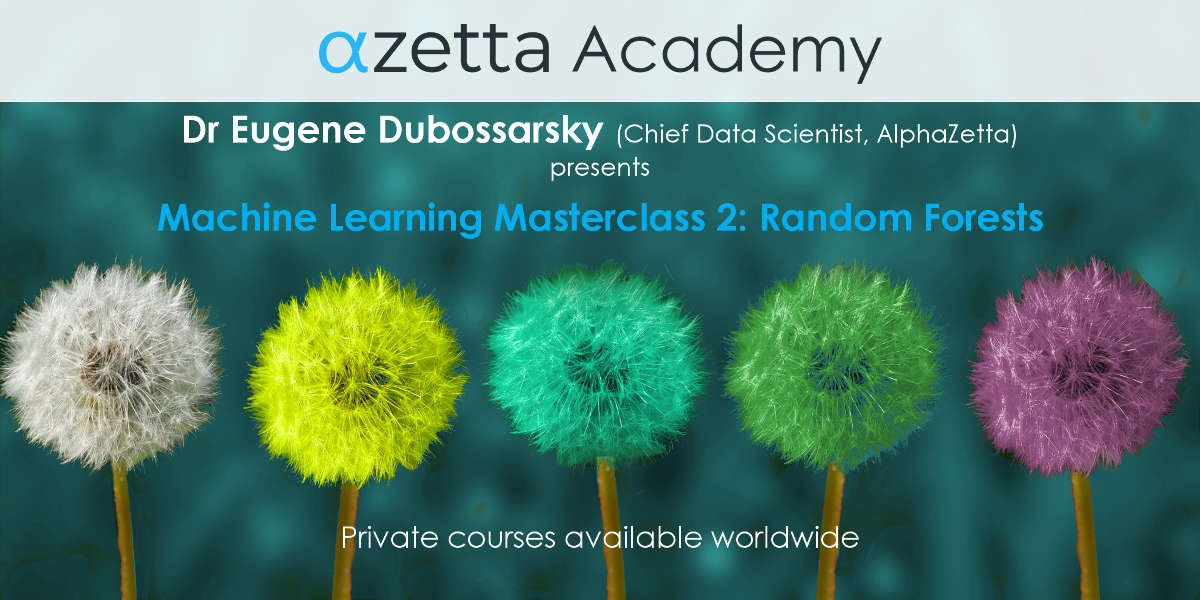This advanced machine learning masterclass will explore the many unique applications and extensions of the randomForest package, many of which are implemented in R. Access to the methods in random forest allows the user to easily solve problems not susceptible to other methods, including deep learning.
Topics will include:
- A brief overview of the random forest algorithm.
- Out-of-sample estimates on training data, and applications in fraud, risk and outlier detection—random forest can make confident predictions on training data, unlike most other methods.
- Single-model quantile regression—estimating a full distribution, not just the mean. Vital for risk-based estimation.
- The proximity matrix—a powerful visualisation, clustering and insights tool unique to random forest.
- Random forest as an unsupervised learning method—outlier detection and clustering when there are no target values—vital for fraud detection.
- ranger, a fast, flexible implementation of random forest in R.
- extraTrees (Extremely Randomized Trees), an extension to random forest that often adds more accuracy.
- Dealing with small data sets and small classes.
A range of other advanced machine learning topics, including recent works and extensions of existing packages, may also be covered.
Trainees are expected to be familiar with R, the basics of machine learning and out-of-sample error estimation, and the basic workings of the random forest algorithm.
Early bird pricing is available until 2 weeks prior.
This is an AlphaZetta public course – group discounts are available during the Early bird period (up to 2 weeks prior): 5% for 2–4 people, 10% for 5–6 people, 15% for 7–8 people, and 20% for 9 or more people. Discounts are calculated during checkout.
Additional Information – Random Forest Advanced Machine Learning Masterclass II
| Audience | Expert This is a practical course, suitable for existing and prospective data-analysis practitioners in government and industry. |
| Objective |
|
| Prerequisites | Students should have completed or have equivalent knowledge to the courses Intro to R (+ data visualisation), Fundamentals of AI, Data Science, Machine Learning and Predictive Analytics and Advanced Machine Learning Masterclass 1 |
| Format | Class |
| Duration | 2 days |
| Course Author | Dr Eugene Dubossarsky |
| Trainer | Courses are taught by Dr Eugene Dubossarsky and/or his hand-picked team of highly skilled instructors. |
| Delivery Method | Online, in-person at AlphaZetta Academy locations or on-premise for corporate groups |
Private and Corporate Training
In addition to our public seminars, workshops and courses, AlphaZetta Academy can provide this training for your organisation in a private setting at your location or ours, or online. Please enquire to discuss your needs.
Scheduled Public Courses
BOOK NOW ⇓
Private and Corporate Training
In addition to our public seminars, workshops and courses, AlphaZetta Academy can provide this training for your organisation in a private setting at your location or ours, or online. Please enquire to discuss your needs.
Other Core Data Science Curriculum Courses
Other R Learning Pathway Electives
Testimonials

The Introduction to R course provided clear and logical assistance to getting up and running with R. More than that, the real value was in providing guidance on the myriad of online resources and introducing me to a network of passionate and helpful R users. Eugene is a knowledgeable and approachable teacher. I wouldn’t hesitate in recommending the course. I feel that I am now fully on the road to applying R and using data to improve efficiency across my organisation.

For someone who does not come from an IT background R is a terrifying program. Before doing the Introduction to R course I had previously done other courses in R but always found myself in over my head because they assumed a high level of program experience (even course that required no prior programming knowledge). This course is not like that at all. It starts at ground zero and teaches you everything you need to know to be able to use R confidently in your everyday workplace. It is a must attend for anyone who wants use R!
I have been very fortunate to be on the R & Data Visualisation course read by Dr. Eugene Dubossarky.
I was thinking of doing computational finance with R—data analysis, statistical modeling, and data visualization for large financial datasets, e.g. quantifying market risk measures—without the heavy lifting in Excel. And I was looking for the most effective introduction to programming in R.
The course exceeded all my expectations, given the breadth and quality of the information provided in Dr. Dubossarky’s presentation. The pace and structure of the course made learning intuitive and comfortable; providing cross-references between different programming languages and R showed the language capability in a familiar way; the elegance and power of R, its ability to facilitate rapid data analysis and visualisation were demonstrated in a number of real-life examples—encouraging us to integrate the course materials into our day-to-day tasks, and continue learning.
What I found also invaluable was his recommendations for numerous online resources, as well as offering his post-course support. All in all, this was the best start I was hoping for. I’d be happy to recommend this course for any corporate environment either in transition or thinking of switching to R.
I have been trying to convert my Stata programming skills to R, however, there have been many times where I just wanted to sit down with someone and have them explain the fundamentals of programming in R. Sure, a number of books and websites have helped me become familiar with R, however, I still didn’t feel ready to translate all of my familiar Stata commands to R (e.g. I am comfortable plotting graphics using ggplot2, however, revert back to Stata for data manipulation). I knew that a more effective way to learn and feel confident would be to sit down with someone and have them explain how they use R, how they clean data, how they plot graphics, etc. I knew that once I felt comfortable with cleaning my data in R, analysis would be less of an issue—I’m happy to research the specifics on my own.
Thank you, Eugene for advancing my R skills. I especially appreciate the time spent explaining the fundamentals of data manipulation—i.e. the code one needs to know before running any basic or sophisticated analysis. The pace of the workshop was perfect.



